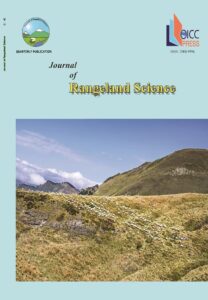Study on the Environmental Factors Contributing to Distribution of Thymus kotschyanus in Taleghan Basin, Iran
Authors
- Leila Darvishi 1
- Mohammad Ali Zare chahouki * 2
- Mohammad Jafari 3
- Hussein Azarnivand 4, 5
- Majid Yousefi Valikchali 6
Abstract
Growth and productivity of plants are mainly affected by various environmental
factors in different ecosystems and natural habitat in the world. This research aims to study
the existing relationships between the phytosociology characteristics of Thymus
kotschyanus and environmental factors in order to find the most important factors
governing development of the species in middle Taleghan rangelands, Iran. Subsequent to
indicating the study region, the required flora and environmental data were collected by
field survey. Plot size and sample size were determined by minimum area and vegetation
procedure methods, using 40 plots along four 100 m transects. The characteristics
including floristic list, percentage of canopy cover, number of plants as well as height, the
largest and smallest diameter, and freshness of T. kotschyanus were recorded. Likewise,
bare soil percentage, litter percentage, and stone and gravel percentage of topsoil were
recorded in each plot. Moreover, in order to study the soil features, eight soil profiles were
taken in each site up to 30 cm depth at the beginning and end of each transect.
Classification of vegetation cover was performed by TWINSPAN analysis while factors
influencing the change in vegetation characteristics of T. kotschyanus were determined by
PCA analysis. Results demonstrated that factors involving slope, altitude, organic matter,
lime content, nitrogen content and soil texture show the highest impact on vegetation
characteristics. Overall, variables including elevation ranging between 2300-2500 m, slope
in the range of 20% – 40%, and fertile sandy loam textured soils in presence of nitrogen
and high organic matter content as well as low lime content provide the most suitable
condition to develop a high production T. kotschyanus.


